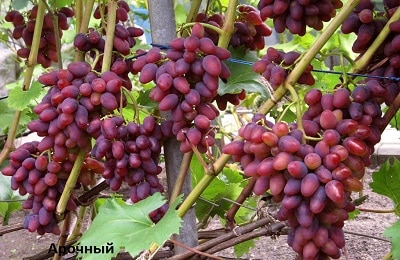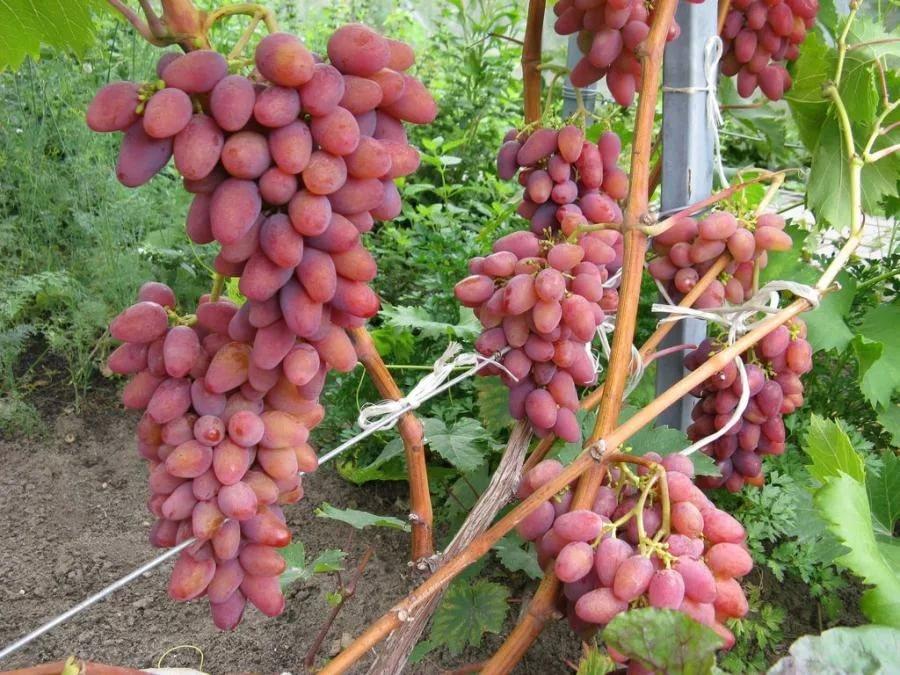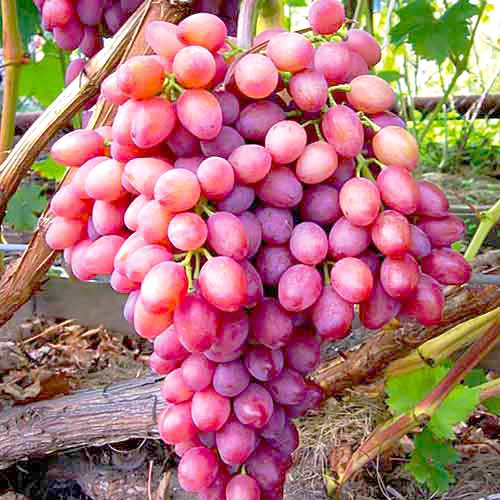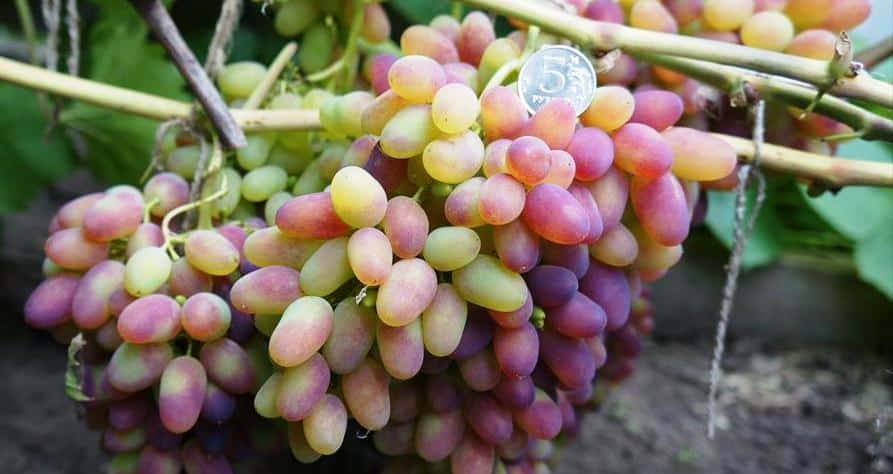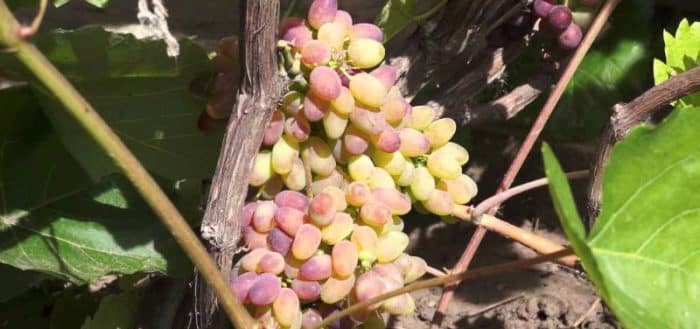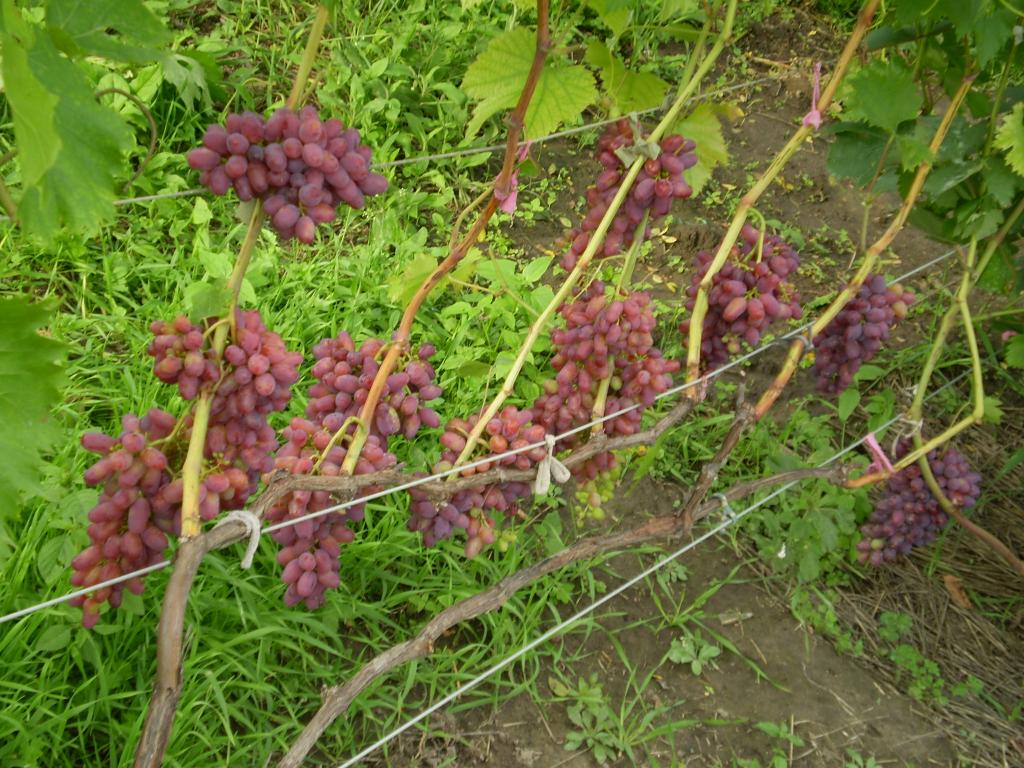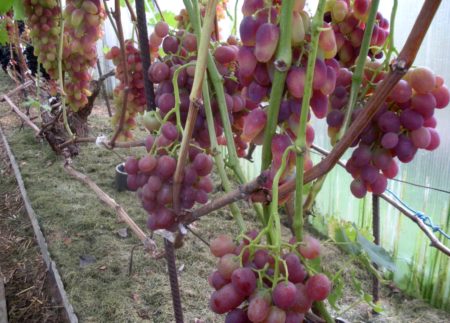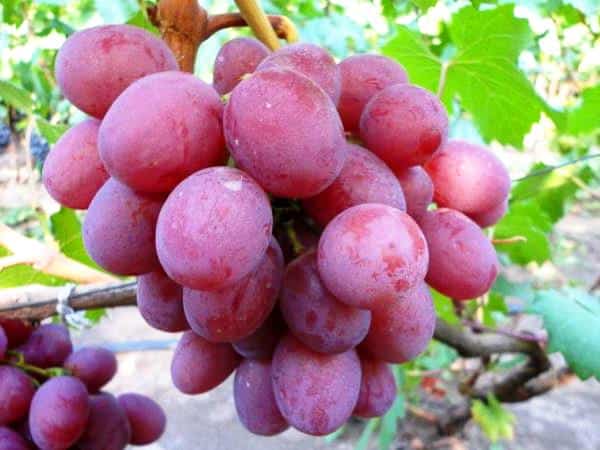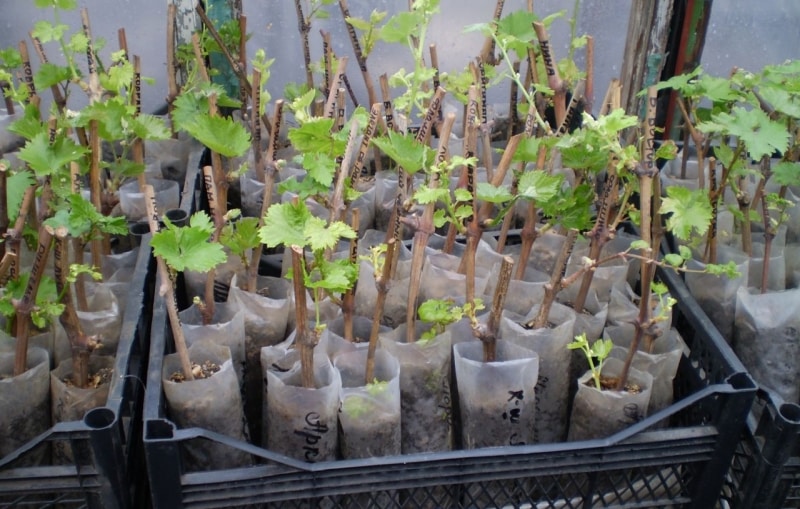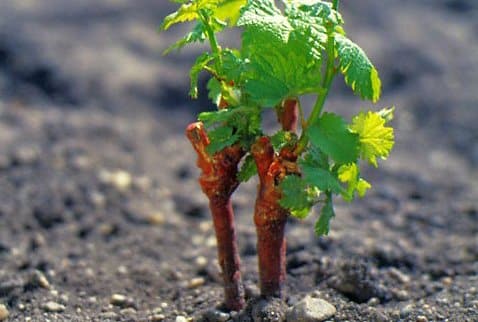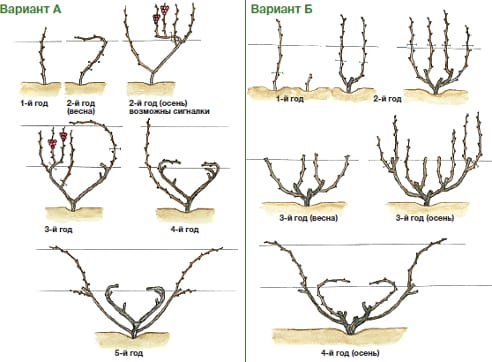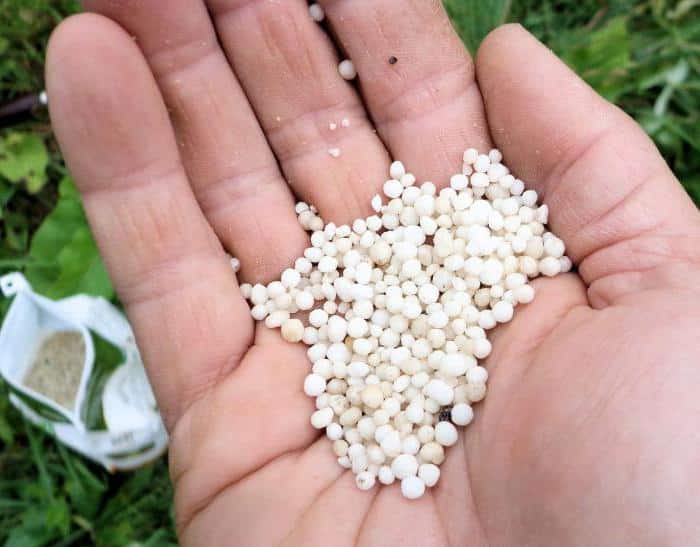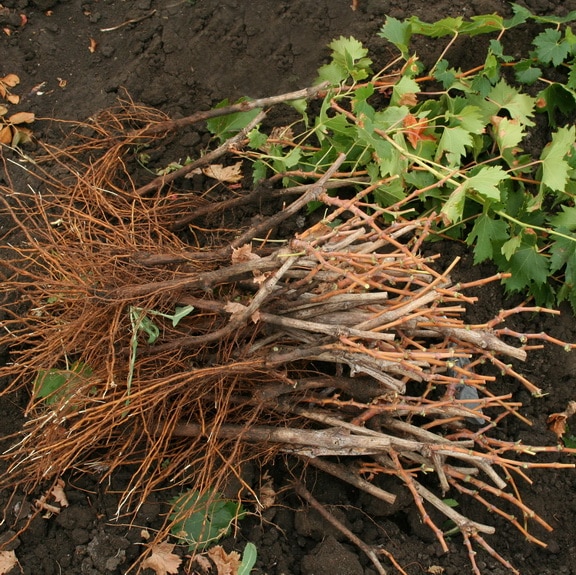Planting this crop on the site is not practiced by all summer residents. Since plants require careful care and careful attention to the intricacies of cultivation. Arch grapes belong to the category of unpretentious plants that require virtually no care. Summer residents who do not have time to grow grapes choose this variety for planting in their dachas.
- Description of grapes Arch
- Historical reference
- Morphology of the bush
- Vine
- bunches
- Berries
- Advantages and disadvantages of the variety
- Main characteristics
- What are the advantages of the arch
- Table hybrid
- Gazebo view
- Growing conditions
- How much harvest can you get?
- Low temperature resistance
- Diseases and pests affecting growth and development
- Benefits and negative effects of use
- Properties of berries
- Planting vines
- What should the planting material be?
- Deadlines
- Selection of land
- How to plant
- Growing and caring for grapes
- Forming a bush by pruning
- We irrigate, weed, loosen
- Fertilizing
- How to protect against diseases and pests
- Using vineyards in the form of an arch
- How can you reproduce
- Mulching and preparing for winter
- Harvest
- Collection
- Application
Description of grapes Arch
In order to avoid mistakes when growing, gardeners study the characteristics of the variety. They help you choose the right location for the plant on the site and implement all the necessary agricultural techniques in a timely manner.
Historical reference
The variety was created by Russian breeders at the All-Russian Research Institute of Winemaking and Viticulture. Vague indicators are given regarding its origin. Arched grapes are the result of pollination of the species Friendship and Intervitis Magaracha. The first variety, which is its progenitor, is accurate, but doubts are expressed about the second. This is due to the fact that when creating the variety, pollination was carried out in a complex manner. Researchers at the Ya. I. Potapenko Institute have been developing new grape varieties for 80 years.
Morphology of the bush
A detailed description of the parts of the plant will give the summer resident the opportunity to obtain extensive information. It will help you decide whether to grow grapes on your plot.
Vine
Ripens in a short time. 15-20 bunches ripen on one vine.
bunches
Externally beautiful, they are in demand among those involved in the production of fruits on an industrial scale. The shape is cone-shaped, the berries are located close to each other.
Berries
The taste characteristics are mediocre, but despite this, Archny grapes are in demand:
- oblong shape;
- the peel is dense, tastes sour;
- seeds are large;
- weight 5.5-6.5 g;
- tasting score 7.7 points.
Berries, being on the bush for a long time, do not lose their taste characteristics and presentation.
Clusters of grapes are transported over long distances without compromising their appearance and taste.
Advantages and disadvantages of the variety
Arch grapes have positive and negative characteristics; after familiarizing themselves with them, the gardener makes the final decision whether to grow this variety of crop or not.
Pros:
- early ripening;
- high resistance to diseases;
- the berries do not lose their taste characteristics and presentation, being on the vine for a long time;
- withstands long transportation;
- frost resistance;
- consistently high yield;
- using grapes to decorate gazebos, arches and other structures;
- versatility of fruit use.
Minuses:
- mediocre taste;
- low rating from tasters.
The main qualities are listed above; the gardener will appreciate the rest by growing grapes in the garden himself.
Main characteristics
The important properties of the plant determine how popular it will become in the future. Having a large number of positive qualities, the variety quickly becomes a favorite among many summer residents.
What are the advantages of the arch
The advantages of being located in an arch are not only the aesthetic appearance and decoration of the site, but also the creation of comfortable conditions for the growth of grapes. The bush receives the required amount of sunlight and oxygen. Therefore, the clusters grow large, large, and the color of the berries is more saturated. Facilitates treatment against insects and diseases.
After watering and rain, grapes grown using the arch method dry out faster.This prevents viruses from developing and infecting plants.
Table hybrid
Arch grapes for universal use. Berries are used for cooking:
- juices;
- compotes;
- jam;
- jams;
- wine and other preparations for the winter.
Grapes are also consumed fresh, so their purpose can be considered table.
Gazebo view
Often this variety of grapes is used to decorate gazebos. In addition to its beautiful appearance, the variety pleases its owners with a high yield of pleasant-tasting and healthy berries.
Growing conditions
For successful cultivation it is necessary to create favorable conditions:
- the soil is preferably sandy loam or sandy;
- groundwater must be at great depth;
- the planting site should be located on the sunny side;
- the pit is prepared in advance in the fall and planted in the spring;
- further care consists of performing standard agricultural techniques and pruning;
- Stop watering in August, the plant should prepare for winter.
By following simple requirements, anyone, even a novice gardener, can get a harvest.
How much harvest can you get?
If the subtleties of planting and care are observed, a stable high yield is obtained. Approximately 10-12 kg per bush.
Low temperature resistance
According to manufacturers, Arch grapes are able to withstand temperatures down to -25 ⁰C.
Diseases and pests affecting growth and development
The variety resists many diseases, but for prevention it is necessary to treat the bushes in spring and autumn. Then the vine will continue to grow and bear fruit.
Benefits and negative effects of use
Grapes have positive and negative effects on the human body.
Benefit:
- Used to prevent cardiovascular diseases.
- Grape juice, like the berry itself, helps the stomach produce gastric juice faster. Which helps digestion and speeds up metabolism.
- Calms the nervous system.
- Has a beneficial effect on the hematopoietic organs.
- Has a positive effect on the respiratory system. The berry is consumed in the early stages of tuberculosis, asthma and other diseases.
- Helps restore tissue.
- Normalizes the functioning of the endocrine system.
- Grapes are useful to humans as a powerful antioxidant.
- Improves vision.
- Used for weight loss. And much more.
Harm:
- Not recommended for use by people with high acidity.
- A strong laxative, should not be used by those with weak intestines.
- Not for diabetics.
- There is a risk of anemia in children; they should be given only light grape varieties.
- The fruits are classified as heavy food; abuse is not recommended.
Despite the positive effects, it is necessary to monitor the body when eating berries.
Properties of berries
Eating berries should be done with caution. This is due to the fact that in addition to positive properties, they also have negative ones. In this regard, it is better to consult a specialist. The properties of the berries make it possible to use grapes not only in cooking, but also in cosmetology and folk medicine.
Planting vines
Arch grapes are propagated by vines. For everything to go well, you need to take into account several nuances:
- choose the right planting material;
- decide on deadlines;
- select a suitable site;
- plant the seedling correctly.
What should the planting material be?
A high-quality and healthy seedling will take root and grow faster.Therefore, you should pay attention to the appearance of the planting material.
Deadlines
Grapevines are planted in autumn or spring. It is better to do this in April or May, depending on the climatic conditions of the region of residence.
Selection of land
A sunny bed, protected from drafts, is suitable for successfully growing grapes. The roots of the plant go deep, so the groundwater must be at a depth of at least 4 m.
How to plant
The pit is prepared in advance, the bottom is filled with drainage, and then a small layer of fertile soil mixed with minerals is laid. A plastic pipe is installed and watering will be carried out through it.
A seedling with bare roots is soaked for 1-2 hours in Heteroauxin. Only then are they transferred to the prepared pit. The earth is poured into a small hill. Water through an installed pipe.
Growing and caring for grapes
A correctly planted seedling is half the success; it is necessary to properly care for the grapes.
Forming a bush by pruning
If you do not thin out the vine, the bush thickens, which leads to a decrease in yield. The first year no pruning is needed. In the 2nd year, 2 branches are left, one with no more than 8 buds, the second only 2. The next year, the procedure is repeated. The vine that retains more buds will have clusters the following year. It is especially important to leave a replacement branch; this is a branch with 2 buds.
We irrigate, weed, loosen
Removing weeds is necessary, as they significantly deplete the soil, sucking out most of the nutrients. Watering is carried out regularly. At first, once a week, 8-12 liters of water for each bush. Further, the number of irrigations is reduced, the volume of water increases. After watering, the soil should be loosened, this will retain moisture and provide oxygen access to the roots.
Fertilizing
Arch grapes require complex fertilizing. It is better to alternate with organic matter, but in moderation. An overfed plant produces only green leaves and shoots and fewer berries than it should.
How to protect against diseases and pests
Prevention works better than any treatment. Therefore, compliance with planting and care standards is half the success. Spring and autumn treatments also help avoid the appearance of diseases.
Using vineyards in the form of an arch
This growing method is used by gardeners as a method of decorating a site. But it's not just about beauty. The crop grown in this way feels good, the plants receive full light and air. As a result, they develop faster and better.
How can you reproduce
There are several ways to grow grapes:
- Seeds. The resulting plant does not take on the characteristics of its parents. You have to wait a long time until the bush begins to bear fruit.
- Graft. A scion is required, onto which a cutting from the mother tree is grafted. This method is used in harsh climates.
- Cuttings. Grow from the tops of the vine in winter or in the spring from prepared sections of the vine.
The gardener selects a convenient method independently, based on the climate.
Mulching and preparing for winter
In the first years, gardeners recommend wrapping the vine for the winter. Mulching will help protect the shoots from frost. In conditions of risky farming, Arch grapes are covered with special material and sprinkled with soil.
Harvest
The final stage of cultivation is harvesting. When all the work invested pays off, and the summer resident receives payment for his work.
Collection
The peculiarity of this grape variety is that, being on the vine for a long time, it does not overripe and does not lose its taste. Therefore, there are no clear deadlines for its collection.
Application
The use of berries is universal; this variety is especially well used in winemaking. Experts say that after six months the wine acquires an aroma that is not lost during subsequent storage. In addition to making wine, the fruits are used for juices, jams, preserves and other desserts. Arched grapes are an excellent solution for areas with gazebos and arches. It is a decoration of the garden and gives an excellent harvest.

